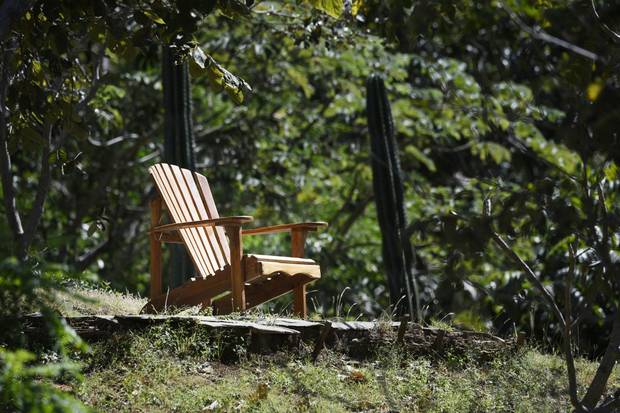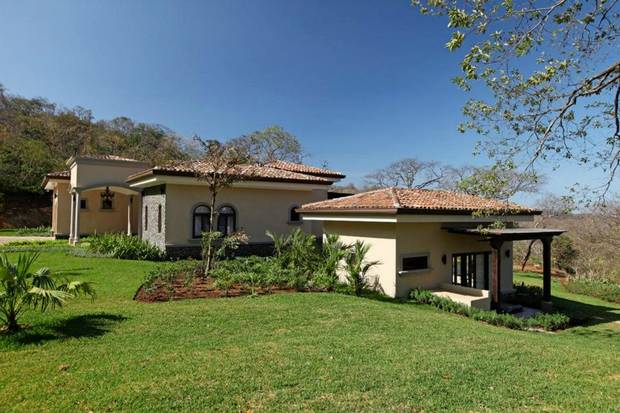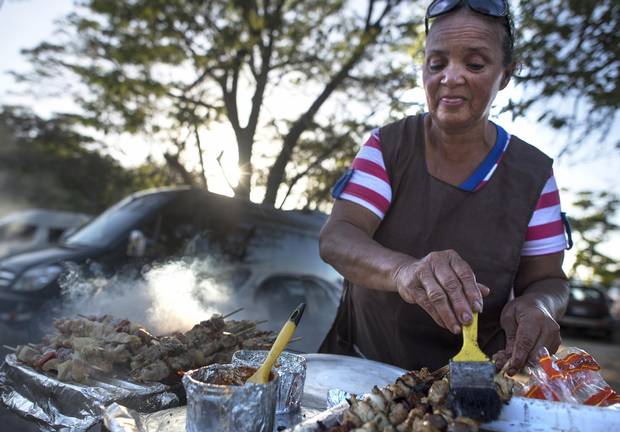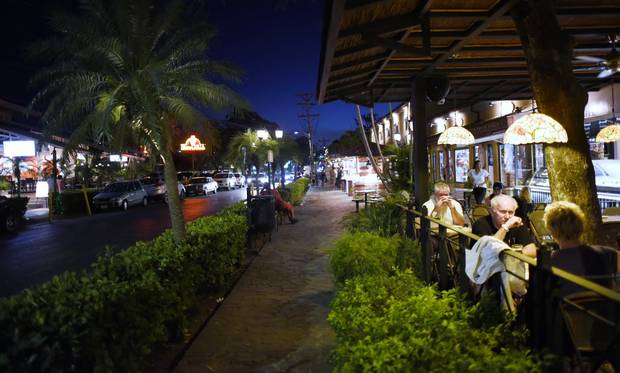Up a steep hillside in the Costa Rican forest, a grand yellow house sits baking in the midday sun.
The path to the front door carries you over stone slabs surrounded by water, a modern, stylized take on a moat. A paved basketball court lies dormant out back. In the front yard, butterflies skip past the blue and green tiled swimming pool. And just beyond the pool across the grass, a half-dozen spindly cacti surround a single Adirondack chair.
It sits like a throne with a commanding view of its surroundings. The vista extends over the undulating forest canopy all the way to the Pacific Ocean. A dozen monkeys gather in the nearby trees, wrapping themselves around the branches as they peer down at the dirt road below. A breeze stirs in the leaves, a brief respite from the 32-degree heat, and the only noise is the tweeting of birdsong.
This is the slice of earth and sky for which Manitoba Premier Brian Pallister has risked his political capital.

A Muskoka chair sits in the yard of Brian Pallister’s Costa Rica vacation home.
Fred Lum/The Globe and Mail
Mr. Pallister has been dogged by his lengthy southern sojourns for nearly a year. The CBC revealed when he was Opposition leader that he spent nearly one in five days in Central America over the preceding three years. During severe flooding in Manitoba in 2014, Mr. Pallister declined to return home to see the damage, and then claimed he was at a family wedding. And rather than curb his trips now that he's Premier, he said in year-end interviews he still planned to spend up to two months a year in Costa Rica, although he revised that to five weeks after The Globe dropped by last week. The Premier says his trips aren't purely pleasure, that he works, too. Yet, he says, he doesn't use e-mail.
In an effort to understand why Mr. Pallister clings so stubbornly to his Costa Rican retreat, The Globe set out in search of the 7,700-square-foot hacienda that has generated so much political heat for the man dubbed the "part-time premier." What does he do? And why would someone who spent more than 25 years fighting for a top job in politics willingly take himself out of the Premier's office for such long stretches?
Tamarindo tourist
Mr. Pallister vacations in the Pacific coast district of Tamarindo, a top surfing destination. It's known by locals as "Tamagringo" because more than 90 per cent of the 5,000 residents in Tamarindo Beach, the main town, are foreigners. Many locals were pushed out by rising rents and food prices when the tourists arrived.
The town's main feature is the long stretch of gold-coloured beach where surfers carve the gentle breaks from sunup to sundown. The main street runs parallel to the shore and is dominated by surf shops, hotels, tourist restaurants and street hawkers. Argentinians with ombré hair and deep tans line up to buy cigarettes and almonds in the grocery store, Australian surfers argue about the true nature of love over cans of beer and Americans fleeing the Midwest winter cheer football teams back home from the local sports bar. The younger travellers stay in low-price hotels and go zip-lining or head for the surf; the older ones in their Tilley hats and pants that zip into shorts tend to seek out nature parks and birdwatching.
A surfer checks out the waves by Tamarindo. The town is popular among tourists and foreigners.
Fred Lum/The Globe and Mail
Jorge Guevara is a local architect who rode his bike to a much quieter beach in Tamarindo when he was a child. He has seen the incredible, chaotic construction craze that transformed the area. "The foreign people like Costa Rica because there's political stability," Mr. Guevara said, sitting in a huge wicker chair overlooking a luxurious hotel pool. The result has been money and jobs for many, but also development done too quickly with too few controls, leading to what he describes as the "lamentable" prevalent architectural style: "concrete staring at the sea."
"It's both good and bad. We gain, but maybe we lose more," Mr. Guevara said. "Now everything is burgers and Coca-Cola."
Fire sale land prices
Mr. Pallister, 62, grew up on a farm in rural Manitoba, graduated from Brandon University and started a successful insurance and financial planning business in Portage la Prairie. Known as an athlete and an intense competitor, he travelled a long road to the top of the political pile. He was first elected as a provincial MLA in 1992, and later ran unsuccessfully for the federal Progressive Conservative leadership, won by Joe Clark in 1998, before serving as an MP for eight years.
After a four-year break, he returned to provincial politics as opposition leader, and won attention for a couple of unusual statements, including that he hates Halloween – "I don't think it's good for the integrity of the kids" – or for a bizarre holiday greeting in which he offered his best wishes to all the "infidel atheists" out there.
In 2012, he bought a second home on Winnipeg's priciest street, Wellington Crescent, for what the Winnipeg Free Press reported was $2-million, exceptionally high in the city's modest real estate market. The 9,000-square-foot house has a seven-car garage and a basketball court, according to the local paper.
A room in Mr. Pallister’s Tamarindo residence.
Mr. Pallister first bought property in Costa Rica in 2007 when he acquired a company that held land in Tamarindo district. Records show that the land, roughly 5.6 acres, had been bought by its previous owners in 2004 at a price of 100,000 Costa Rican colones, or about $280 (U.S.) at today's exchange rate. It's not clear what price Mr. Pallister paid for the company.
He bought more property, through the same Costa Rican company, in April, 2010. On this occasion he purchased 2.25 acres for the recorded price of $1,000. Later that same year in October, he purchased a third plot of 5.4 acres, a sale recorded at $10,000. Those figures are drawn from legal documents filed in the Costa Rican national registry.
A leading real estate agent in Tamarindo said those prices are very low. He described them as "fire sale prices – distress sale prices, or helping-out-a-friend prices." He said five acres in the same development recently changed hands for $80,000, a price that previously he would have considered low. The market fluctuates and value can be hard to establish, but he said a good guideline for the going rate would be about $50,000 for every 1.2 acres, in stark contrast to the more than 7.6 acres Mr. Pallister purchased in 2010 for just $11,000.
The Globe asked Mr. Pallister whether those prices were recorded accurately and completely, and whether there was an explanation for the low price. The Premier's office did not answer those questions, saying through a spokeswoman that the subject of his property had been "ventilated" elsewhere. Mr. Pallister was not present when The Globe was turned away at the door of his Tamarindo estate.
Watch Visit the Costa Rican holiday spot where Manitoba’s premier spends his working vacations
Family time
Costa Rican holidays first surfaced as an issue during the April, 2016, provincial election, which Mr. Pallister won handily over the NDP. The issue seemed to disappear only to resurface in December's year-end interviews, when he said he planned to spend six to eight weeks at his foreign property, igniting another round of criticism. Mr. Pallister, who spent 36 days in Costa Rica from the time just before the election to the end of 2016, according to his office, defended himself by saying he works long hours and rarely has time with family. He and his wife have two adult daughters who live in Winnipeg.
Manitoba faces a number of difficult negotiations this year, including cost-cutting at Crown corporations and the possibility that union contracts will be opened up to roll back wages. Mr. Pallister did not attend the first meeting with the unions in early January, when he was in Costa Rica. While he was away, other provinces were negotiating health-care deals with the federal government, and Manitoba does not yet have one. Shortly before leaving for Costa Rica again last week, he described conflict over indigenous people exercising their right to hunt at night as contributing to "a race war." Mr. Pallister was subsequently not available to clarify what political opponents and indigenous leaders decried as unnecessarily inflammatory language. All of these issues have attracted criticism.
Mr. Pallister, who declined an interview with The Globe and Mail, told reporters in Toronto earlier this month that he works while he's in Costa Rica, he's only a phone call away and considers himself a good manager of his time.
"If the price of my building a stronger family and relationships with my wife and my daughters is that I get questions like this, I'm happy to take the questions," Mr. Pallister told The Canadian Press.

Mr. Pallister’s Tamarindo residence. The premier argues his trips aren’t purely pleasure, that he works, too. But he doesn’t use e-mail.
Fred Lum/The Globe and Mail
Just getting to Tamarindo is time consuming. From Winnipeg, the shortest trips into the nearest major airport at Liberia, an hour's drive from Tamarindo, have 13-hour itineraries with two stops in the United States. West Jet and Air Canada offer direct flights to Liberia from Toronto, but they leave in the morning, making a Winnipeg connection difficult. In the event of a crisis, his office said the Premier could be expected to return "immediately."
Although it's one of the safest countries in the region, the Canadian government advises travellers to exercise a high degree of caution when in Costa Rica, where, it says, crime, particularly theft, is a problem, and that Costa Rica has one of the highest rates of traffic accidents in the world.
The entry to Mr. Pallister's property is blocked by a locked iron gate. A sign shows an image of a Glock 9 mm handgun, the logo of a local security company, and the message says "armed response and security." From the road, it's just possible to make out the homes of his neighbours on nearby properties, which are also large, expensive-looking estates.
'I see him play golf all the time'
Ana Isabelle Herrera, a local woman, lives with her children in a small, wooden shack at the side of the road not far from Mr. Pallister's estate. The rickety two-bedroom structure has a combined kitchen and living room, and fresh air and daylight intrude through large cracks in the boards. They don't own the land, but four years ago they got running water and electricity. Ms. Herrera is cooking vegetables over an open flame in the yard, discussing with her daughter plans for the dream home they might one day build, one with concrete walls and windows. They find intermittent work in the hotels and resorts, and get by on about $250 (U.S.) a month.
She said she sees Mr. Pallister drive past in his truck sometimes. He doesn't dress as elegantly as in his political photos, she said with a laugh.
"He says 'Hello.' He's very friendly," Ms. Herrera said. Her daughter, Kimberly Nunes, said she often sees Mr. Pallister at the Hacienda Pinilla, a massive gated resort that caters to expats and wealthy tourists, where she sometimes works as a maid.
"I see him play golf all the time," she said.
A round of golf at Hacienda Pinilla costs roughly $196 (Canadian), plus $65 for club rental, if you need it. The resort also offers tennis, horseback riding and a luxury spa that advertises itself as among the top five in Latin America.
It's relatively easy to understand the attractions of such luxury, if you can afford it. But there is also a spiritual side to Tamarindo that seems to attract people in search of a kind of peace.
At the Tamarindo church, Sunday service is packed. The guitar-playing minister, Lyle Watson, wears shorts and a surf shirt and stands before a driftwood cross; the congregation sits on white plastic lawn chairs, open to the tropical breeze. On the way in, the pastor's wife mentions that the lesson that day might be of interest. It's from Matthew 23:12: "The teachers of the law and the Pharisees sit in Moses' seat. So you must be careful to do everything they tell you. But do not do what they do. They do not practise what they preach."
A local church just outside Tamarindo, Costa Rica, Jan 15 2017.
Fred Lum/The Globe and mail
After the service the pastor, Mr. Watson, said yes, he does know Mr. Pallister.
"Very tall, right?" Mr. Watson asked. (Mr. Pallister, a former Brandon University basketball player, is 6-foot-8). Mr. Watson recalls that he's "some kind of politician in Canada," although he can't remember the details. "He's a great, super friendly, super nice guy," he said. Mr. Watson used to chat with him at a coffee shop where Mr. Pallister liked to stop, but he has never seen him in church.
Mr. Watson said it's not hard to understand what might attract someone to Tamarindo. The sunsets are beautiful and the beach is great. Life is slower. It tends to attract a certain kind of person, he said.
"A lot of times, it's people wanting a new start, for whatever reason. A divorce, death in the family, and they come here to reinvent themselves," he said.
Congregant Jean Mixon, an energetic woman with greying curly hair, was a corporate vice-president in the U.S. before she and her husband relocated.
"There is a peace here that I can't describe, and that I've not found elsewhere," she said. "In the U.S., people are very conscious of differences, of money, or where you live, or cultural differences. Here, I don't see that difference. There's something that ties people together. The other thing I would say is in the U.S. we get very busy about just being busy. I was that person. I worked 70 hours a week and was always on e-mail and thinking about work. Here, it's okay to watch the sunset. That's an acceptable activity.

Mary, a street food vendor, cooks and sells grilled chicken and pork on Calle Central.
Fred Lum/The Globe and Mail
"People have a tendency to get vision. They can think outside the box, maybe stop dealing with the next emergency, whatever it is," Ms. Mixon said.
There is a saying in Costa Rica that's akin to a national motto, and it's emblazoned on nearly every T-shirt and trinket: "Pura Vida." Literally, it translates as "pure life" and it seems to mean anything from life is great to relax, whatever's troubling you is no big deal. Street hawkers say it when they get turned down by tourists, friends shout it across the street as a greeting. Many people say it's the "pura vida" attitude that they love about this place.
One woman from Manitoba who was holidaying in Tamarindo said she fully supported Mr. Pallister's Costa Rican working holidays, comparing them favourably with Justin Trudeau's trip to the Aga Khan's private island. The woman, a Manitoba government employee, said she fears Mr. Pallister's planned cuts could soon put her out of a job (she declined to give her name), but added she believes that, as a successful businessman, he'll do what's best for the province.
"I think they [the critics] are just jealous that he's successful," the woman said. "Good on him for having a vacation and a more balanced family life."
Personally, though, she had her cellphone in her hotel room and was answering work e-mails every day during her holiday, she said.
That's the norm, according to Emilie Cieslik, owner of 15Love, a Tamarindo bed and breakfast. She and her husband, both Belgians, have invested in their WiFi because they know most of their guests work while on holiday.
"Now the expectation is that you work, because you can work anywhere," Ms. Cieslik said. "Good Internet is essential. Many guests work for an hour or two in the morning and then try to enjoy the day."

Diners enjoy a warm evening on Calle Central, Tamarindo.
Fred Lum/The Globe and Mail
Perhaps Mr. Pallister will be a new kind of leader, one willing to speak out against the tyranny of spending 9 to 5 in the office. Perhaps his message to government employees will be that as long as the work gets done, it doesn't matter if you're in the tropics. And who in Manitoba could begrudge a fellow citizen a hot break from the long, frigid winter? After returning to Winnipeg in January, Mr. Pallister invited some local reporters to his office to see the reading materials he took with him to Costa Rica, and books and document folders were arranged on his desk for the photo.
One of the books on his desk was
What is Government Good At, written by Donald Savoie, Canada Research Chair at the University of Moncton and an expert in public administration. Prof. Savoie said he was glad to see his book on the Premier's table, and had a little advice. Every premier has a lot to learn, he said, particularly early on, about working with cabinet, taking briefings from senior public servants and managing a caucus, often the most difficult task. He cited the precedent of Richard Hatfield, premier of New Brunswick from 1970 to 1987, who in those later years was known to spend a lot of time outside the province.
"He was in New York often, he was in the U.S., and frankly he was a pretty good premier. I have to say, though, that the first seven or eight years he was not absent. He was at his desk," Prof. Savoie said. As for Mr. Pallister, "what I find quite peculiar is that this is a first-time premier. There's a learning curve, and the best place to learn is at your desk," he said. "I'm not sure it would ever be acceptable [to spend extended periods abroad], but you could understand it a lot better if it was his last mandate and not his first. … It's a full time job and it's important that you're there."
Mr. Pallister's spokeswoman said that "the time spent away allows additional thought and reflection on policy decisions than what would be possible during days interrupted regularly by meetings and emergent issues."
It's easy to picture him in the Adirondack chair, reading books and flipping through dossiers as the sun sets over the Pacific. Nice working holiday, if you can get it.